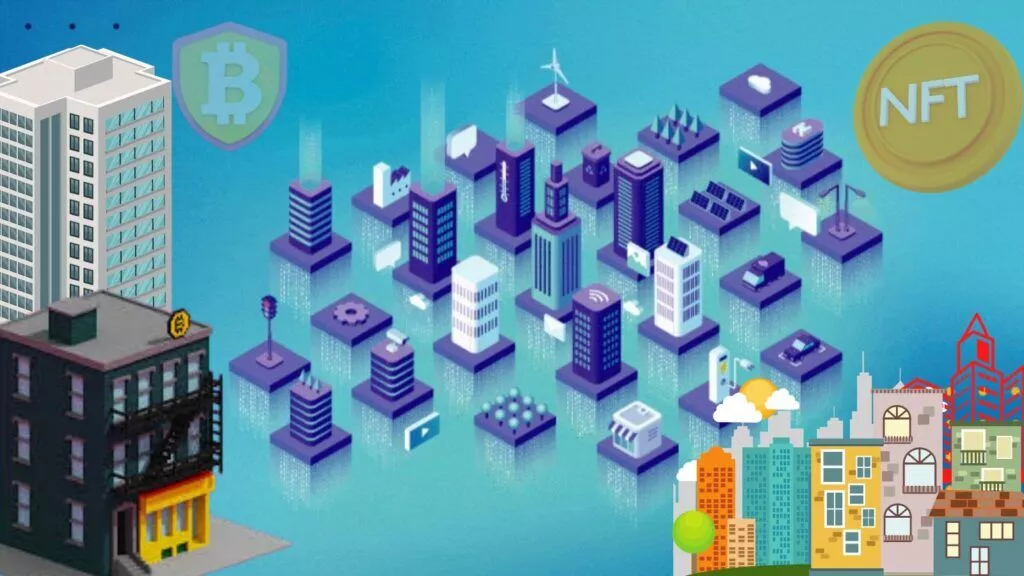Fractional ownership, smart contracts, and tokenisation…. With some of these features in spotlight, NFTs promise to introduce greater transparency, enhanced profitability, and increased inclusivity to the real estate market as time progresses. Platforms like LynKey and TokenHouse are pioneering at the forefront of this transformation, offering real-life examples of how NFTs could unlock the future of real estate transactions.

Investment And Transactions
From record-breaking prices for NFT art to NFTs used as marketing tools for popular fast-food chains, the NFT trend is taking on the industries at a much-accelerated pace. The cryptographic assets representing a unique quality and backed by blockchain technology, NFTs are easy to implement and execute. However, it’s rather a bigger challenge to apply them to slow-to-change industries such as real estate.
Some of the pioneers in the real estate realm like LynKey and TokenHouse are exploring the untapped potentials that lie at the bedrock of the NFTs to define the future of real estate transactions.
So, what does it all mean?
How do NFTs enhance liquidity and accessibility of real estate?
Traditional real estate transactions can be slow and cumbersome, often involving legal paperwork, inspections, and intermediary fees. NFTs can streamline this process, making real estate investments more liquid and accessible.
To facilitate the sale of real estate as an NFT, the initial crucial step involves meticulous legal preparations to ensure full compliance with existing regulations. Once the legal groundwork is laid, the process of minting an NFT with comprehensive property information, including all requisite legal documentation, can commence.
Minting, a procedure accessible to anyone, involves the uploading of a JPEG image and a smart contract to an NFT marketplace—a secure online platform designed for NFT creators and buyers. This process imbues the NFT with the essential paperwork, disclosures, and reports, endowing it with the legal authority to serve as unequivocal proof of ownership.
Following the creation of the NFT, it can be listed on an NFT marketplace for potential buyers to explore and bid on. Buyers participating in the auction may choose to pay for the property in either fiat currency or cryptocurrency.
Once the transaction is successfully concluded, with the funds securely transferred to the seller and the NFT seamlessly transferred to the buyer’s digital wallet, the buyer can proceed to finalise the property transfer through the necessary paperwork. Subsequently, ownership of the NFT signifies ownership of the associated real estate—a groundbreaking shift in the property transaction landscape, significantly reducing the time traditionally required for property acquisition.
NFTs enables fractional ownership of real estate
NFTs have the power to democratise real estate by enabling fractional ownership. Imagine owning a small piece of a luxurious apartment in New York City, a vineyard in Tuscany, or a beachfront villa in Bali, all made possible through NFTs.
LynKey is a proptech and smart tourism developer based in Singapore which is tokenising all aspects of property development, including purchases, leases, land use, and related tourism entertainment, in Vietnam, Singapore, and other parts of the world.
The NFTs created for unique experiences like a luxury sea-view villa with particular, a penthouse with pink walls and a butler on the top floor, or a blue yacht offering a particular luxury experience and of particular value.
These NFTs allow investors to gain exposure to a diversified portfolio of properties as well as experiences that are unique to everyone.
The smart contracts feature is the backbone of NFTs in real estate
NFTs can incorporate smart contracts, which automate various aspects of real estate transactions, including property management, rental agreements, and revenue distribution.
TokenHouse converted a high-value prime central London residential property, valued in the multi-million-pound range, into a unique NFT. Within this NFT, TokenHouse incorporated a sophisticated smart contract that bestows upon the NFT holder the legal entitlement to the property’s beneficial rights and grants them access to the official title of the apartment located within the One Blackfriars Tower. As of June 23rd, 2022, BNP Paribas has appraised this property with a market value of £6.5 million.
Smart contracts also enable NFTs to provide an immutable and transparent record of property ownership and history. This can reduce fraud, disputes, and title-related issues in real estate transactions.
Revolutionising the real estate transactions with NFTs
As the potential applications of NFTs within the real estate sector continue to expand, this transformative synergy is poised to redefine the industry’s conventions. The streamlined ownership transfer process, taking only a matter of minutes, represents a revolutionary departure from the typically protracted property acquisition timelines.
With the contemporary consumer preference for convenient, one-click solutions in buying and selling, the amalgamation of NFTs and real estate appears inevitable, ushering in an era where property transactions are more efficient and accessible than ever before.

Pallavi Singal is the Vice President of Content at ztudium, where she leads innovative content strategies and oversees the development of high-impact editorial initiatives. With a strong background in digital media and a passion for storytelling, Pallavi plays a pivotal role in scaling the content operations for ztudium’s platforms, including Businessabc, Citiesabc, and IntelligentHQ, Wisdomia.ai, MStores, and many others. Her expertise spans content creation, SEO, and digital marketing, driving engagement and growth across multiple channels. Pallavi’s work is characterised by a keen insight into emerging trends in business, technologies like AI, blockchain, metaverse and others, and society, making her a trusted voice in the industry.











